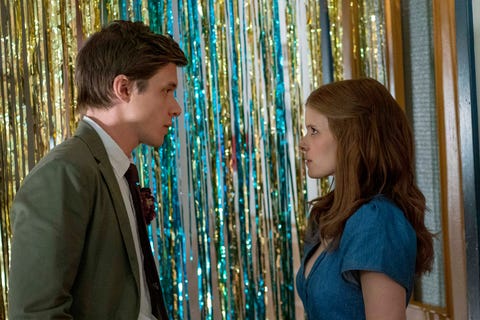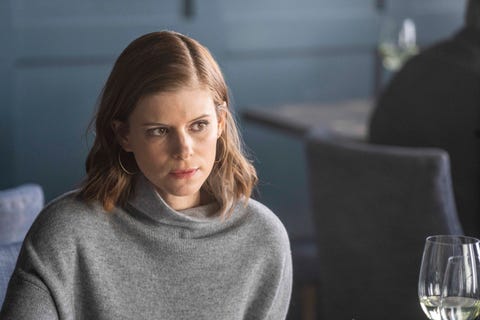Spoilers for A Teacher "Episode 10"
In the wake of the #MeToo movement and the vital conversations it sparked, onscreen depictions of sexual abuse have become both more widespread and
more nuanced. Recent shows likeI May Destroy YouandUnbelievable center the psychological journey of the victim, while the newly released Promising Young Womanputs a thrillingly subversive spin on the rape-revenge movie. FX's bold and complex miniseries A Teacher, which wrapped up its run this week, is another uncompromising depiction of sexual exploitation, following the predatory relationship between a young teacher (Kate Mara) and her infatuated student (Nick Robinson).
A Teacher is a Trojan horse of a show‚there are moments in its early episodes that feel ripped right from teen dramas like Riverdale and Pretty Little Liars, as Mara's Claire and Robinson's Nick exchange meaningful stares across the classroom and meet up for semi-illicit tutoring sessions laced with sexual tension. But the show never loses sight of its own darkness, and as soon as Claire's seduction of Eric is complete, it's made abundantly clear that this is not an "affair," but a predatory grooming relationship between an adult and a minor.
Once the truth comes out, Eric's trauma is complicated further by the conflicting messages he's getting about what's happened to him. "For a male victim of Eric’s age, and this particular situation, he's a legend among his friends," says creator Hannah Fidell. "He's living with these very conflicting ideas of what has happened."
Below, Fidell discusses the complexity of depicting a male victim's experience, why Claire is a "textbook" example of a female predator, and why this week's series finale had to jump ten years into the future in order to wrap up Eric's story truthfully.
Let’s go back in time a little. You adapted the series from your own 2013 movie, so what was your original inspiration for the movie?
I had seen some list online called “The 50 Hottest Teachers Who Slept With Their Students.” At the time, I was working in a restaurant, and I also remember seeing this kid walk in who looked like he could've either been in high school or could have been 25. Seeing that particular kid, after earlier that week having seen this list, made me really think about, What is driving these women? They look so normal in their photos, and yet their behavior is so dangerous. That was the first part.
The second part, which I only realized after I had made the film, was that I've had my own experience with sexual assault, being a survivor. Mine wasn't with my teacher, it was with a friend who I trusted. So it was a way for me to really explore the lies he told himself in the aftermath, and how he justified his own behavior to himself. Exploring that, through the eyes of a female teacher, was a way for me to reconcile my own experience in a way I felt I could do it because it was different enough.

So you had that realization after making the film, and then it was a few years until you started working on the show, right?
Yeah, and I think what was so lucky in having those six, seven years in between when I made the film and when the show came out was that #MeToo happened. The landscape was different, and when we started working on the show, I was in a place where I could explore the story more from a victim's perspective and had the time and the budget and the space to do that.
It’s interesting how Eric and Claire’s affair develops through the first few episodes. You’re walking a fine line, because there has to be a real spark between them, right? We have to see something in order to keep us compelled, and to some extent you want us to be rooting for them at first.
It was very much conceived to be that way because, for me, I wanted the audience to go on that journey with Eric. And part of that means feeling that infatuation at first, and then as the show progresses, pulling the rug out from under him and from under the viewer. Really showing how wrong, and how dangerous this is, and what the consequences are.
Right, there’s a pivot moment where the viewer is like, “No, wait, oh God, this is terrible.” For me, that came in episode 3 when she leads him out of the school party and they have sex for the first time. The sexual tension dissipates, and you realize how disturbing this whole scenario is.
Every scene we really mapped out, starting from the beginning of, "Who's the audience going to root for in this scene?" Because we knew we were walking a very fine line where it would be very easy to construe this [show] as glorifying a predatory, pedophilia relationship. The problem is, if you break it down, how can you show this kind of relationship in a realistic way, without showing that there’s infatuation on both sides? It was very carefully constructed for that reason.

Pop culture has traditionally treated this kind of relationship, between a young male student and an attractive female teacher, as sexy. Even in recent shows like Riverdale, it was treated as kind of illicit, but basically still hot, rather than a predatory crime.
Yeah, Dawson's Creek does it, and I remember watching that when I was in middle school. And since the show came out, people have talked about Pretty Little Liars, Riverdale… I haven’t seen that show so I can’t comment on it, but I felt an obligation to make sure we got it right because of my own experience. We worked with RAINN, the Rape Abuse Incest National Network, and early on, at the script phase, we had several consultants who specialized in male victims of childhood sexual abuse who read through the scripts and really helped us understand the difference between male and female victims. There's a pretty vast difference in the way men and women react, in general, to surviving various forms of abuse.
How did you approach depicting that in the show?
Especially for a male victim of Eric’s age, and this particular situation, he's a legend among his friends. So it’s confusing, being told one thing by his peers, and feeling this intense guilt over Claire being in jail, feeling like it’s all his fault. At that point, I imagine she never told him it wasn't his fault. So he is living with these two very conflicting ideas of what has happened. When you do that, you lose all sense of self because you don't know what's right and what's wrong anymore.
From what I learned talking to guys who had been in Eric's position, it takes at least a decade for the reality to really start sinking in, which is the reason we made all those time jumps. He goes through these stages of grief and denial, and he's going to act out, he's going to drink more, because he's hurting, whether he's fully aware of it or not. And I think in a lot of cases, sometimes it's hard for men to even put words to what they're feeling. For Eric, he can't do that until that very last scene, 10 years later, which is actually, truly, how it often goes down in real life.
What becomes obvious in that scene is that Claire is, 10 years later, still telling herself a sanitized version of the story. And even when Eric is like, “That’s not what happened,” she doesn’t hear it. She hasn’t really come to terms with what she did.
No. And that's the thing I think is so traumatic for survivors—oftentimes, I would say 99 percent of the time, you don’t get the apology you deserve. That scene is really about Eric realizing he’ll never get what he needs, and that it's no longer about her, it's about him needing to move on with his life. Once he makes that realization that she's going to continue living in this fantasy, he has ownership over it, which is a part of the healing process, and it becomes his story. Which is also why we ended on him leaving instead of her. I find that incredibly powerful, since the show is called A Teacher. That final scene is like “Nope.” It's no longer about her, it's about him moving forward and closing that door.

Claire’s backstory, without justifying her actions, did make a lot of sense to me. The idea that she didn’t really get to have her own youth because of her dad’s alcoholism, so she’s trying to fill that void.
That is a textbook reason why women end up having predatory relationships with their students: They missed their childhood in some way. It's almost like they're searching for youth and these kids represent youth, they represent something they never had. I don[’t think Claire ever necessarily liked Eric for who he was. It was really what he represented to her.
You mentioned that the #MeToo movement happened in the years between the movie’s release and the series. What impact did that have on how you approached the show?
That was something we talked a lot about in the development phase with FX, particularly the question of, what’s next? What is the correct future for these abusers? Are they allowed to find—by the way, I’m not saying that they are or aren’t, and clearly someone like Harvey Weinstein is in a different category. But for someone like Claire, who did an evil thing but I don’t think is necessarily an evil person, can she ever move on with her life?
That, to me, feels like the next phase of the #MeToo conversation. Whereas I know personally, and what we've shown in the show is that for survivors, it is very hard to move on. You deal with the consequences, you deal with the PTSD, you deal with what has happened to you and it shows up in ways that are shocking, even years later. So I was very interested in exploring the question of “Does Claire have to wear a scarlet letter for the rest of her life now?” I still don't have an answer to that, but I think she does, probably.
On that note, I was really surprised by the revelation that Claire has settled down ten years later and has a family. How did you decide on that future for her?
To me, it made it that much more horrible for Eric that, seemingly, she was able to move. But at the same time, I feel like she's gonna blow it again. A year, two years, three years, she is someone who just has to blow up their life, and it's just a matter of time until she does it again. For now, it seems like she's found some sense of normalcy, but her arc is really about her awareness of her behavior, or lack thereof, and her inability to understand the consequences on people outside of herself. Her understanding does evolve, but she just cannot live in the truth because it would kill her. She has to live in that denial.


